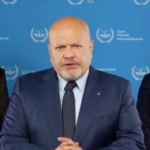International Criminal Court Issues Global Arrest Warrants for Netanyahu and Gallant

Six months after its first announcement, the International Criminal Court issued arrest warrants on Thursday, 21 November 2024 in relation to Israeli prime minister Benjamin Netanyahu and that nation’s former defence minister Yoav Gallant in response to a swag of alleged crime against humanity and war crimes perpetrated against the Palestinian population of the Gaza Strip.
The warrants were issued under the broader ICC Situation in the State of Palestine investigation and ICC prosecutor Karim Khan has further issued a warrant for senior Hamas advisor Mohammed Diab Ibrahim Al-Masri in relation to war crimes and crimes against humanity. Although Israel has previously stated it has killed this man, while Hamas has not confirmed that is the case.
Originally, Khan had sought to raise further arrest warrants against Hamas head Yahya Sinwar and political bureau head Ismail Haniyeh, however both these leading Hamas figures have been confirmed as having been killed by Israeli forces.
The warrants arrived after much speculation they may never be issued. Israel is not a party to the ICC, and it fails to recognise its jurisdiction, while Palestine is a member state. And in response to two points Israel raised against the warrants with the ICC in September, the court confirmed it could exercise jurisdiction over Israel, while that nation could not challenge the issuance of the warrants.
As for how the warrants will impact upon Netanyahu and Gallant, neither of the men can be arrested in Israel, as it does not recognise the ICC, however the 124 member states that have ratified the Rome Statute of the International Criminal Court are now required to arrest either of these men if they enter their jurisdictions, so they can stand trial for the atrocity crimes against their names.
Long time coming
“Today, based on the evidence presented by my office, the judges have confirmed that there are reasonable grounds to believe that Rome Statute crimes have been committed,” advised the ICC prosecutor in a 21 November 2024 statement.
As to the Netanyahu and Gallant warrants, Khan added “that there are reasonable grounds to believe that each has committed the war crime of using starvation as a method of warfare and crimes against humanity of murder, persecution, and other inhumane acts, as a direct perpetrator, acting jointly with others.” And they further stand charged as intentionally directing attacks against civilians.
Khan made a dramatic announcement flanked by two of his key ICC staff members on 20 May 2024, in which he told the global community that he had applied for arrest warrants against Netanyahu and the then Israeli defence minister, which was an unprecedented move, as usually the ICC prosecutor would not mention such matters until warrants have been issued.
The arrest warrant applications were then handed on to the three magistrates of the ICC pretrial chamber, and back in May, the process was expected to take several months prior to a decision being made.
“As I emphasised in May,” Khan added, “these applications were made following an independent investigation, and on the basis of objective, verifiable evidence vetted through a forensic process.”
Prosecuting international crimes
After being adopted by a 1998 diplomatic meeting in Italy, the Rome Statute of the International Criminal Court established the ICC in its seat at The Hague, when it entered into force on 1 July 2002, and it also set in place the core international criminal offences of genocide, crimes against humanity and war crimes at that point, with the fourth offence, the crime of aggression, being added in 2010.
One hundred and twenty four nations have ratified the Rome Statue, with Australia having done so on 1 July 2002.
Ukraine has became the latest nation to have ratified the Rome Statute in August this year, however it did so in a manner that means it will not officially recognise the jurisdiction of the international court for another seven years. And as mentioned prior, Israel does not recognise the court.
As it is incumbent upon all member states on ratifying the Rome Statute, Australia was required to enact the various forms of the three core international atrocity crimes that were in force at the international level in mid-2002, of which Australia did that year.
So, the various offences of genocide, war crimes and crimes against humanity all now sit within division 268 of the Criminal Codes Act 1995 (Cth).
Many of these crimes carry life imprisonment, and those that don’t, do carry steep maximum prison sentences regardless.
The peculiar aspect to these offences is they carry universal jurisdiction, which means that Australian lawyers can prosecute any person for perpetrating any of these offences anywhere across the planet. And this country is yet to enact the crimes of aggression locally.
The Howard government drafted the legislation that enacted these core atrocity crimes into Australian domestic law, but it did so with a hitch, which results in the need to seek the approval of the federal attorney general in order to run such prosecutions or they can’t be progressed and so far, this has meant that all attempts to prosecute these offences domestically have failed.
Federal parliament is set to vote on whether to remove what is known as the ‘attorney general’s fiat’ on 27 November, when it deliberates upon a private members bill brought by Senator Lidia Thorpe, which seeks to remove the AG’s block on prosecuting these crimes.
War criminals in the house
In response to the ICC announcement, Australian foreign minister Penny Wong wrote on X that “Australia respects the independence of the ICC and its important role in upholding international law”, while this nation is focused on working with others “to press for an urgently needed ceasefire”. And this is consistent with her statements on announcement of the warrant applications in May.
However, in March this year, Australian law firm Birchgrove Legal lodged a case with ICC prosecutor Khan, in which barrister Sheryn Omeri KC sets out the evidence against key Australian politicians, including prime minster Anthony Albanese and Penny Wong, which conveys that they’ve acted as accessories to the crime of genocide in regard to their actions in respect of the Gaza catastrophe.
Birchgrove Legal then confirmed on 16 July that the Office of the Prosecutor of the ICC had added the Australian correspondence “to the evidence gathered as part of the ICC’s investigation into the Situation in the State of Palestine”, which is the same 2015-launched ICC case that resulted in the issuance of the two arrest warrants against the key Israeli politicians on Thursday.
As for Netanyahu, he’s since stated in relation to the ICC issuance of the warrants that they are based on “fundamentally unfounded accusations” that the pair have committed crimes against humanity, which he posits is the opposite of the truth. And the Israeli top minister added that the move hinders the rights of all nations to defend themselves against terrorism.
And as for the ICC arrest warrants, these mark the first time that the international court has issued such orders in relation to western leaders, and while Netanyahu and Gallant don’t have to be concerned about local Israeli police sweeping in to arrest them today, there are now vast tracts of the globe that neither man can enter without fear of being taken into custody for prosecution.







